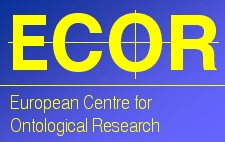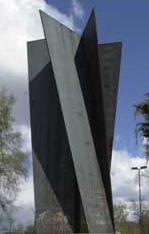Local Members
|

ECOR representative:
Barry Smith |
Institute for Formal Ontology and
Medical Information Science
The Institute for Formal Ontology and Medical Information Science was founded in April 2002 as part of the
Faculty of Medicine of the University of Leipzig utilizing a grant of the Alexander von Humboldt
Foundation. It comprehends an interdisciplinary research group with members from Philosophy, Computer and
Information Science, Logic, Medicine, and Medical Informatics. IFOMIS established itself as a center of
theoretically grounded research in both formal and applied ontology. Its goal is to develop a formal
ontology that will be applied and tested in the domain of medical and biomedical information science.
In August 2004 IFOMIS moved its base of operations from Leipzig to Saarland University in Saarbrücken. |
IFOMIS
Universität des Saarlandes
Postfach 151150
D-66041 Saarbrücken
Germany
Secretariat
Tel.: +49 (0)681-302-64770
Fax: +49 (0)681-302-64772 |
| |
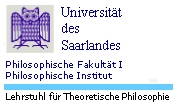
ECOR representative:
Ulrich Nortmann |
Institute of Philosophy
|
Philosophisches Institut
Universität des Saarlandes
Postfach 151150
D-66041 Saarbrücken
Germany
Secretariat
Tel.: +49 (0)681-302-3324
Fax: +49 (0)681-302-4745 |
| |


ECOR representative:
Paul Buitelaar |
DFKI Competence Center Semantic
Web
The Competence Center Semantic Web (CCSW) is a research and development center within DFKI that coordinates
cooperation between DFKI projects and departments on the development and use of Semantic Web technologies
based on XML, XSLT, RDF Schema, OWL, rule languages and (semantic) web services. The focus is on
distributed information management with Web-based standardized object representations, ontologies, and rule
systems. CCSW considers the Semantic Web as a higher-level structure that emerges from a multitude of
community specific semantic webs. |
DFKI GmbH
Forschungsbereich Sprachtechnologie
Stuhlsatzenhausweg 3
Building 43.1
D-66123 Saarbrücken
Germany
Secretariat
Tel.: +49 (0)681-302-5282
Fax: +49 (0)681-302-5338 |
| |

ECOR representative:
Holger Stenzhorn |
Department of Pediatric Oncology and Hematology - Saarland University Hospital
|
Universitätsklinikum des Saarlandes
Klinik für Pädiatrische Onkologie und Hämatologie
Kirrberger Straße
Gebäude 9
D-66421 Homburg
Germany
Secretariat
Tel.: +49 (0)6841-16-28397
Fax: +49 (0)06841-16-28302 |
| |
External Members
|

ECOR representative:
N.N. |
Institute of Medical Biometry and Medical Informatics,
University Medical Center Freiburg
As part of the medical faculty, the Institute of Medical Biometry and Medical Informatics sees itself as being committed to the
research of information processing in the health care system. Using formal methods and informatics concepts
and adopting current information technologies, it supports the health care services, the patient care as
well as the medical research and teaching in terms of evidence-based medicine (EBM). A dedicated group in
the department focuses on research in biomolecular and biomedical ontologies on both a foundational and
application-oriented level. |
Institut für Medizinische Biometrie und
Medizinische Informatik
Abteilung Medizinische Informatik
Stefan-Meier-Str. 26
79104 Freiburg - Germany
Secretariat
Tel.: +49 (0)761 - 203 6702
Fax: +49 (0)761 - 203 6711 |

ECOR representative:
Maurizio Ferraris |
Laboratory for Ontology,
University of Turin
The Laboratory of Ontology of the University of Torino (Labont) is a centre of study and research that is
part of Center for Theoretical and Applied Ontology (CTAO). The basic aims of the LabOnt are three:
1) To promote studies and researches in ontology and metaphysics, especially those related to
problems of theory application.
2) To improve the communication among different fields of research, through the setting of
workshops and conferences on interdisciplinary issues.
3) To improve the cooperation between Labont and the industries.
All areas of research provide necessary contributions to understand how we use our language and our
concepts in relation to the world. In turn, this understanding turns to be fundamental each time we are
engaged in finding a way to link concepts of a theory and entities dwelling the world.
The outcomes of the LabOnt are spread across several collaborations with accademic and scientific
pubblications. |
Laboratory for Ontology
Department of Philosophy
University of Turin
Via S. Ottavio 20,
10124 Turin - Italy
Secretariat
Tel.: +39 011.670.3738
Fax: +39 011.812.4543 |
| |

ECOR representative:
John Bateman |
Bremen Ontology Group, University
of Bremen
The Bremen Ontology Group is a working group rooted in the Collaborative Research Center for Spatial
Cognition (SFB/TR8) of the Universities of Bremen and Freiburg. The group combines contributions from
computer science, formal algebraic specification and methods, linguistics, robotics and qualitative spatial
reasoning. Ontology design and development is being pursued in three main areas: foundational issues of
formalization and computational tools, linguistically motivated ontologies for the support of human
language technology, and generic ontology modules for reasoning in spatially-aware agents. |
John Bateman
Faculty of Linguistics and Literary Science (FB10)
University of Bremen
Bibliothekstr. 1
28334 Bremen - Germany
Secretariat
Tel: +49/421-218-3126
Fax: +49/421-218-4283 |
| |


ECOR representative:
Brandon Bennett |
Foundational Ontology Group,
University of Leeds
Within both the Artificial Intelligence and Geographical Information Systems communities, Leeds is
recognised as a major international centre for research on Qualitative Spatial Reasoning. This achievement
is built on the fundamental work of Professor Tony Cohn on Region Connection Calculus. The work has wide
application. Its use in spatial information systems is being explored with commercial partners. Application
to studies of high level vision, such as the automatic, intelligent analysis of video images, is under
investigation.
Part of the work in the group is devoted to Foundational Ontology. A resource is maintained for
dissemination of ontological formalisms to support both foundational research and more practically oriented
knowledge engineering developments. In addition, a particular foundational approach to formal ontology
construction is promoted. |
Foundational Ontology Group
Brandon Bennett
School of Computing
University of Leeds
Leeds LS2 9JT, ENGLAND.
Secretariat
Phone: +44 (0)113-343 1070
Fax: +44 (0)113-343 5468 |
| |

ECOR representative:
Kevin Mulligan |
Centre for Ontology -
Geneva
The Centre for Ontology of Geneva has been created in 2004 by the concerted actions of persons involved in
three different disciplines, but with a common understanding on the need to promote the development of
better ontologies on sound formal bases. These disciplines are philosophy, biology and medical linguistics.
The Centre for Ontology aims at:favouring the communication between its members, promoting the ontology
building tools and techniques, developing an infrastructure for dissemination of information, applying for
research funds, teaching ontology and knowledge representation.
There are presently three entities represented in the Centre for Ontology: The Department of Philosophy at
the Faculty of Letters; The Service d'Informatique Médicale at the Faculty of Medecine; The Swiss
Institute for Biology. |
|
| |
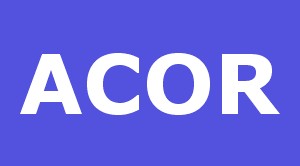
ECOR representative:
Christian Kanzian |
Austrian Centre for Ontological Research
ACOR is a scientific centre established to improve the communication among philosophers working in
ontology in Austria and other countries in Central Europe.
The aims of ACOR are:
- to support young philosophers working in ontology
- to raise the standing and scientific quality of ontology as a branch of academic philosophy
- to advance the applications of ontology and to demonstrate its relevance to extra-philosophical
disciplines
The means to reach the aims include:
- the organization of high-level conferences and summer schools to bring together young ontologists
with leading researchers
- the support of publications in the field of ontology via book series and other avenues
- the promotion of interdisciplinary projects, especially in cooperation with research institutes in
areas such as biomedicine.
|
ACOR
Christian Kanzian
University of Innsbruck
Karl-Rahner-Platz 1
A-6020 Innsbruck
Austria
Secretariat
Tel: +43/512/507-8527
Fax: +43/512/507-2736 |
| |
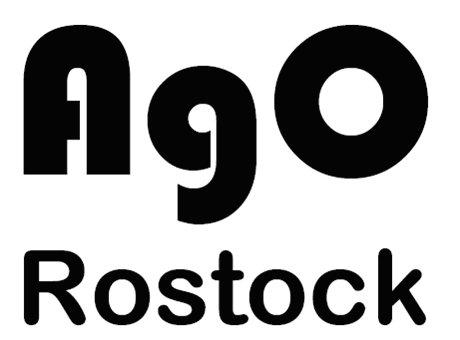
ECOR representative:
Ludger Jansen |
Arbeitsgruppe Ontologie (AgO)
The "Arbeitsgruppe Ontologie" (AgO) at the University of Rostock connects the University's researchers in philosophy and information sciences with domain experts (e.g., from the life sciences) who want to use or develop ontologies. Members of the group work, among other topics, on biomedical ontology in general (both for clinical and for research applications) and on neuro-ontology in particular, on social ontology, on the modelling of temporal and modal concepts, and on the ontology of dispositions and events.
|
AgO Rostock
Ludger Jansen
Institut für Philosophie
Universität Rostock
18051 Rostock
Germany
|
